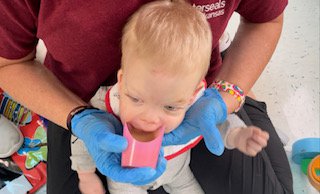
In May, we celebrate Better Hearing and Speech Month. Each week we will bring you some pertinent and useful speech and hearing-related information from our team of fabulous speech therapists.
This week, we focus on pediatric dysphagia or feeding and swallowing difficulties.
Things You Should Know
- Dysphagia means difficulty with feeding or swallowing.
- It is a symptom, not a disease.
- Oral dysphagia refers to problems with using the mouth, lips and tongue to control food or liquid.
- Pharyngeal dysphagia refers to problems in the throat during swallowing.
Some common disorders related to swallowing problems in children include:
- Brain injury
- Birth defects
- Cleft palate
- Cerebral palsy
- Gastroesophageal disorders, including reflux
- Heart or lung conditions
- Head or neck cancer
- Neuromuscular disease
- Prematurity
- Sensory problems
- Stroke
Signs and Symptoms of Feeding and Swallowing Problems (Dysphagia)
- Problems coordinating sucking, swallowing and breathing while bottle-feeding or drinking from a cup or straw
- Coughing
- Choking
- Gagging
- Color change during or after feeding
- Lengthy feeding times (greater than 30 minutes)
- Trouble chewing
- Congestion during or after feeding
- Change of breathing rate with feeding
- History of pneumonia
- Sensation of food being stuck in the throat
- Limited intake of food or liquids
- Refusal of previously accepted food or liquids
- Failure to gain weight
- Evidence of food or liquid in a tracheotomy tube during or after eating
Treatment for Dysphagia
Treatment for dysphagia is based on the nature and severity of the child’s feeding and swallowing problem.
Treatment may include some or all of the following:
- Develop strength, range of motion, and coordination of the lips, tongue, cheek, and jaw muscles for efficient eating and drinking
- Help decrease oral sensitivity or oral aversion to foods and liquids
- Decrease behavioral resistance to feeding
- Work on strategies to decrease the risk for aspiration
The speech-language pathologist may also suggest the following after talking with the child’s medical team:
- A change in food textures or in the thickness of liquids
- A change in the feeding equipment, such as the nipple, bottle, cup or utensils
- Strategies to help with drinking and eating
Our speech therapists at Easterseals Arkansas are ready to help you navigate through feeding and swallowing challenges your child may be experiences.
